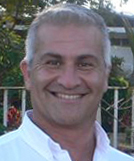Farès el-Dahdah takes the helm at the Humanities Research Center
Born in Lebanon and educated in the United States, Farès el-Dahdah spent his teenage years in Brasilia, the capital of Brazil, where his father served as the Lebanese ambassador. With such a background, he clearly understands what it means to be geographically mobile.
Now, as the new head of the Rice University School of Humanities’ Humanities Research Center (HRC), he plans to put a heightened emphasis on “cultural mobility” and how it plays a role in the humanities. Cultural mobility is a term coined by literary and cultural critic Stephen Greenblatt, who argues that cultures, even traditional ones, are rarely stable or fixed.
El-Dahdah, a professor in the Rice School of Architecture, took the helm at the HRC July 1. He succeeds interim director Scott McGill, an associate professor of classical studies.
“I plan to operate on the assumption that there is no outside to the humanities,” el-Dahdah said, referring to his discomfort with the notion that disciplines are limited to particular geographies or locked off from others. “I have a particular interest in research that focuses on that which is neither settled nor stable, the kind of research that produces unprecedented alliances between fluid cultural formations strewn across, and beyond, historically fixed fields of inquiry.”
As the head of the HRC, he oversees a campus hub that, since its founding in 1987, has been committed to fostering international and interdisciplinary connections that further the research goals of the humanities at Rice. In addition to bringing international scholars to campus each year through its sponsorship of conferences, workshops and international faculty fellows, the HRC supports research at the faculty, postdoctoral, graduate and undergraduate levels that bridges national and institutional boundaries.
“Farès el-Dahdah has a sense of international culture that is rare,” said Dean of Humanities Nicolas Shumway. “The Humanities Research Center embraces every discipline at the university and understands the humanities very broadly. Science, culture, history, politics all take place within a humanistic context. As an architect, Farès may be perceived as an unusual or out-of-the-box choice, but he isn’t when one conceives of the humanities in this broad sense.”
A faculty member at Rice since 1996, el-Dahdah teaches survey courses on the history of architecture and seminars on architecture and urbanism in Brazil. His research has focused primarily on Brazilian modern architecture and, more recently, in collaboration with Alida Metcalf, Rice’s Harris Masterson Jr. Professor of History, on the spatial and social evolution of Rio de Janeiro.
El-Dahdah plans to spend the upcoming months meeting with a broad range of faculty to get a clearer picture of their ideas and needs. “The HRC is, after all, a research arm of the School of Humanities, and it has to reflect what the faculty’s research interests are,” he said.
For information about the HRC, its programs and activities, see http://hrc.rice.edu/.


